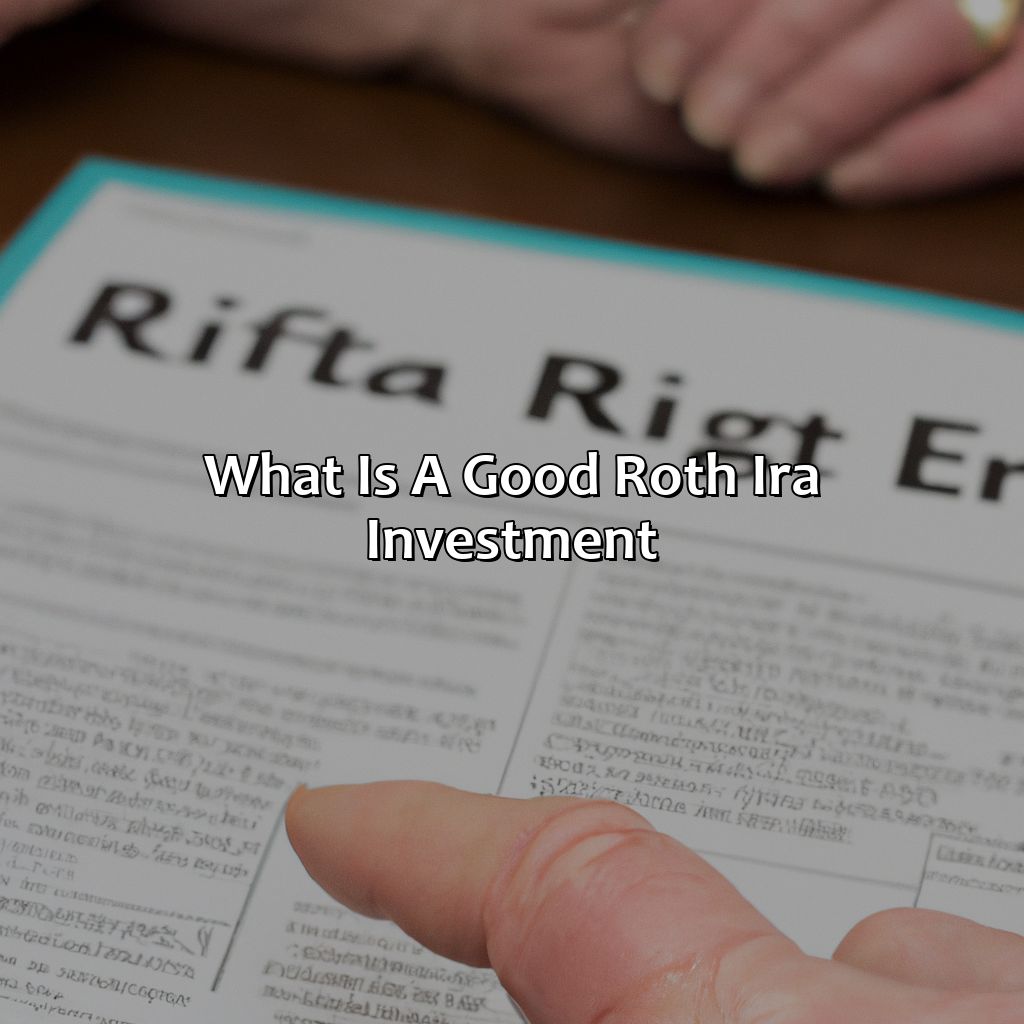What Is A Good Roth Ira Investment?
Key Takeaway:
- A Roth IRA investment is a retirement savings account that allows individuals to save after-tax dollars, and grow their savings tax-free, making it a great long-term investment option.
- Starting a Roth IRA investment at an early age is important to take full advantage of the long-term benefits of compounding interest. Waiting until later in life can limit the potential growth of savings.
- When choosing a good Roth IRA investment, it’s important to consider investment goals, risk tolerance, and fees and expenses. Suitable investment options for a Roth IRA include stocks, bonds, mutual funds, and exchange-traded funds (ETFs).
Are you looking for a safe and profitable way to invest for retirement? A Roth IRA can provide you with the perfect opportunity to make your money work for you and gain a tax-free retirement. Learn more about the benefits and options available for a Roth IRA.
What is a Roth IRA investment?
A Roth IRA investment refers to a retirement account that allows individuals to invest after-tax dollars for tax-free growth and withdrawals in retirement. Contributions are not tax-deductible, but qualified distributions are. It is a good way to save for retirement and minimize taxes in the future.
Roth IRA investments offer a range of investment options, including stocks, bonds, mutual funds, and exchange-traded funds. Diversifying investments is important to manage risk and maximize returns. Moreover, contributions can be made at any age, and there are no required minimum distributions during the account owner’s lifetime.
It is important to note that there are income limits to contribute to a Roth IRA. Additionally, while there are no penalties for withdrawing contributions at any time, withdrawing earnings before age 59 ½ may result in taxes and penalties. Thus, it is advisable to hold the account for the long term to maximize tax-free growth.
According to Forbes, the maximum contribution limit for Roth IRA in 2021 is $6,000, and individuals age 50 and older can contribute an additional $1,000 as a catch-up contribution.
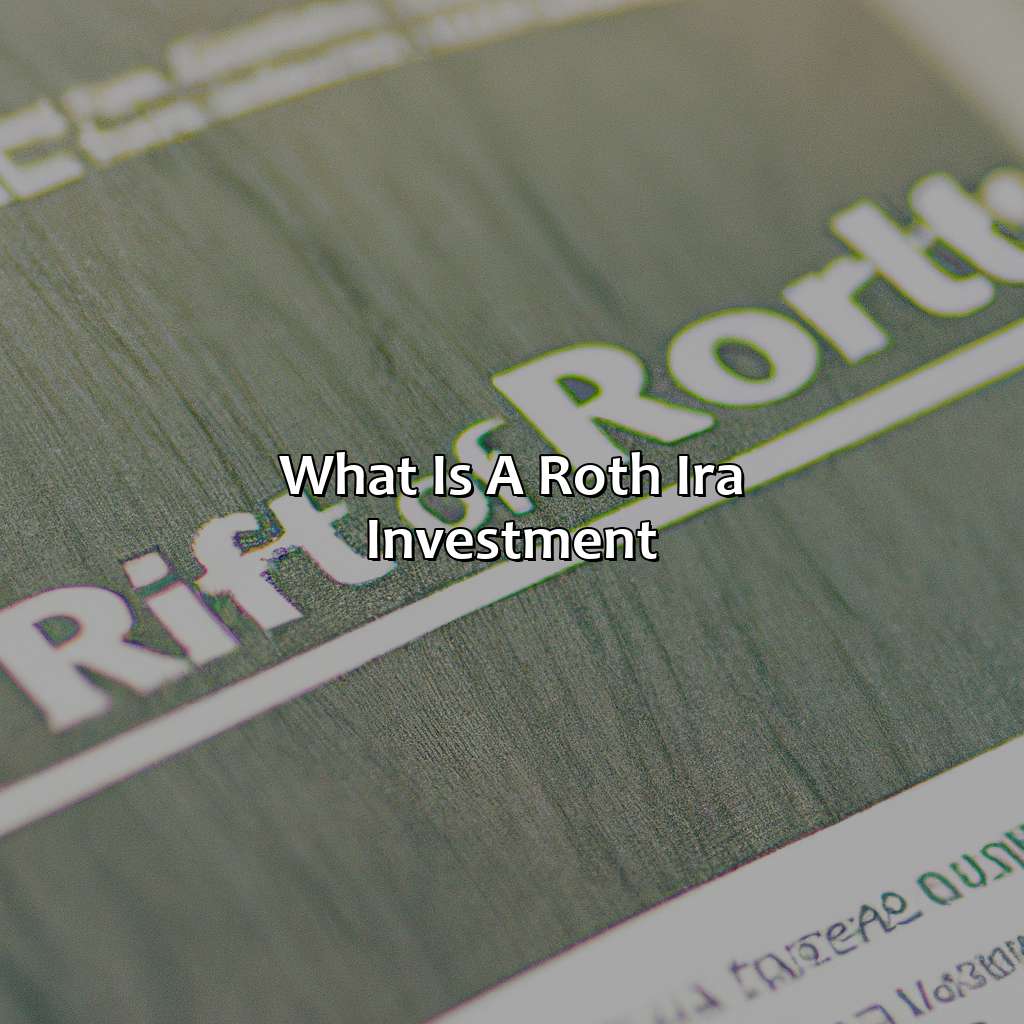
Image credits: retiregenz.com by James Washington
Importance of starting a Roth IRA investment
Why Investing in a Roth IRA Is Critical
Investing in a Roth IRA is vital for your financial stability. By starting a Roth IRA investment, you can ensure future financial security without any tax obligations on withdrawals.
Benefits of Beginning a Roth IRA Investment
Starting a Roth IRA investment is an excellent financial decision as it offers tax-free and penalty-free withdrawals, even before retirement. A Roth IRA investment also has the potential to grow, and you can contribute to it annually, regardless of your age.
Unique Aspects of a Roth IRA Investment
With a Roth IRA, you can withdraw the principal amount at any time without paying any taxes or penalties. You can also transfer your traditional IRA to a Roth IRA without any income limitations, and unlike traditional IRAs, Roth IRAs don’t require minimum distributions.
Don’t Miss Out on A Secure Financial Future
Start your Roth IRA investment now to secure your financial future and avoid the fear of missing out on its benefits. Delaying your investment may decrease the amount you receive, so invest wisely and achieve financial freedom.
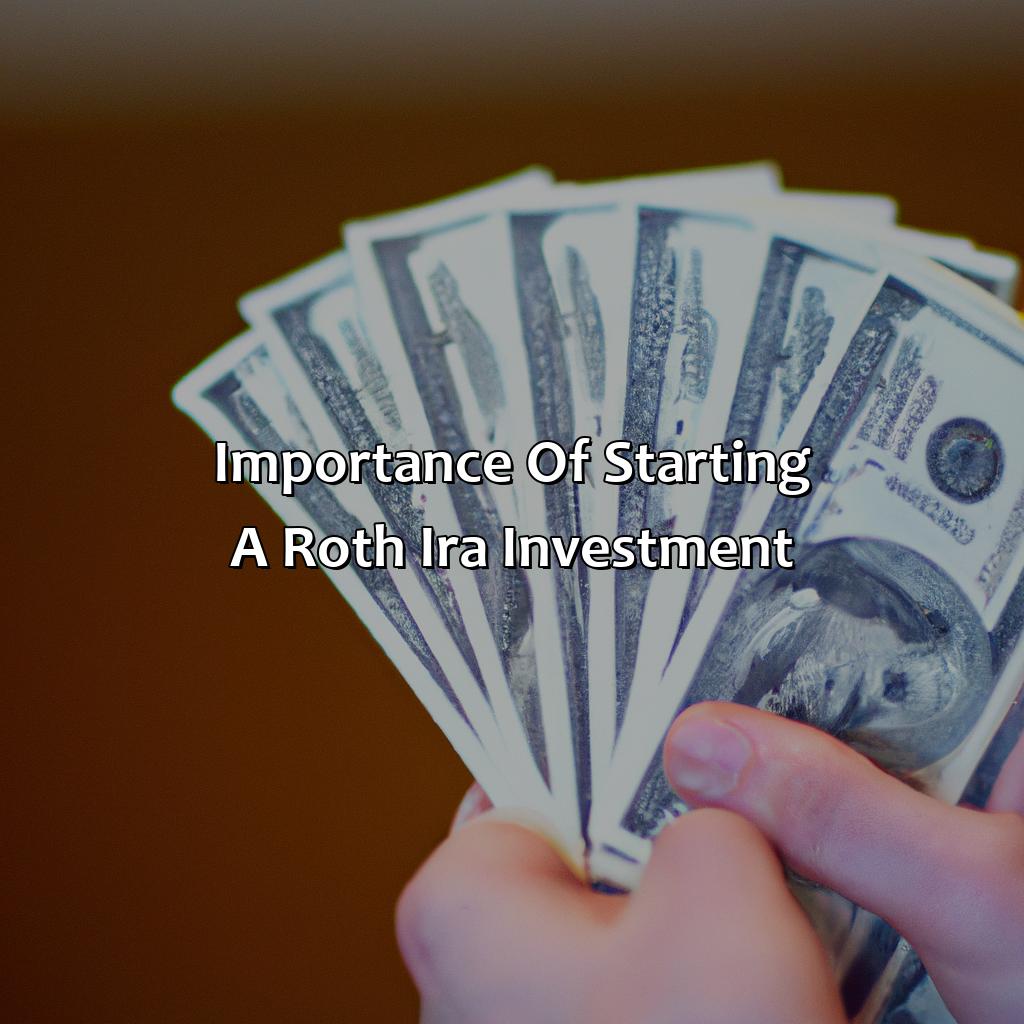
Image credits: retiregenz.com by Yuval Duncun
Factors to consider when choosing a good Roth IRA investment
Choosing a good Roth IRA investment requires considering several factors. We’ll explain why setting goals matters, how risk tolerance affects decisions, and the importance of understanding fees and expenses. All this to find the right solution for your needs!
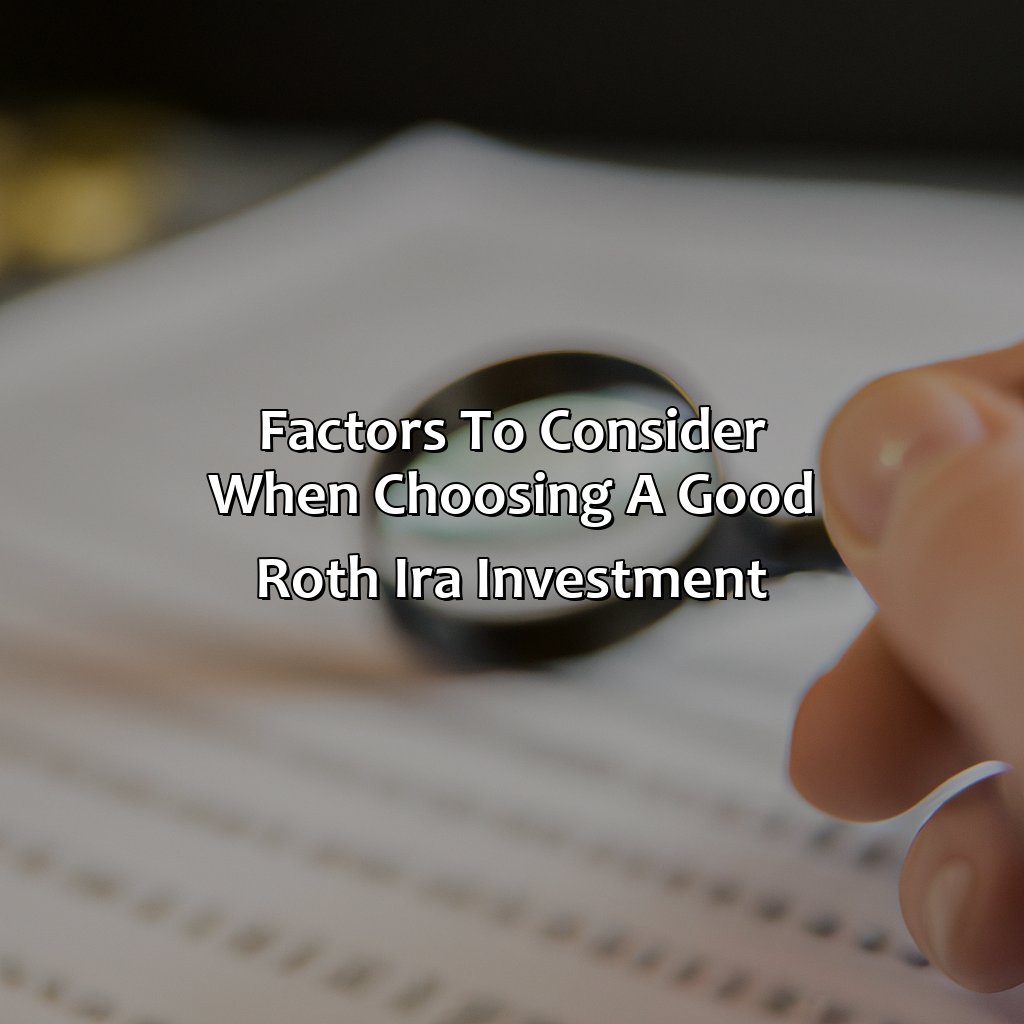
Image credits: retiregenz.com by Yuval Woodhock
Investment goals
To effectively choose the right Roth IRA investment, one must establish their investment objectives. Knowing where you want your money to go and what you want to do with it will determine the types of investments you should make. Consider whether your goal is growth, income or a combination of both.
Your investment goals play a significant role in determining how well your portfolio performs. If your aim is growth, you need to invest in stocks or similar assets that can increase in value over time, while income goals may lead to investments like bonds that pay regular dividends and offer consistent cash flow. Additionally, if retirement is the primary goal for your Roth IRA investment, consider diversifying across various sectors and not limited to tech companies or other popular investment angles.
It’s important to understand how each investment works before deciding on which ones to add to your portfolio. Educate yourself about potential investments before committing funds to them. Look into things like historical data, fees and dependencies on outside factors such as interest rates or changes in government policy.
One suggestion is first finding low-cost index funds for broad market exposure rather than singular stock picks. As research shows picking individual stocks are much harder when compared against years of track record information that indexes hold. Another opportunity could be exploring the world of exchange-traded funds (ETFs) which allow investors access across multiple asset classes in real-time trading sessions at a lower cost compared with mutual funds.
Risk tolerance is like playing poker – some people are all-in, while others fold at the slightest hint of uncertainty.
Risk tolerance
Understanding your willingness to take risks is crucial when choosing the right investment option for your Roth IRA.
Risk appetite plays a vital role in determining how much risk you can tolerate and how comfortable you are with potential losses. Depending on your risk tolerance, you may choose between conservative low-risk investments like bonds or high-risk investments such as stocks.
It’s essential to understand that there is no one-size-fits-all investment strategy, and what works for one investor may not work for another. Therefore, it’s crucial to invest according to your comfort level and avoid taking unnecessary risks.
Investing in a Roth IRA has several advantages, including tax-free withdrawals upon retirement. However, not investing wisely could mean missing out on substantial growth opportunities that could affect your retirement savings.
Make sure you review all options carefully, seeking advice from financial experts if necessary. Remember – it’s better to be safe than sorry when it comes to investing in your Roth IRA!
Be prepared to break out your calculator, because these fees and expenses can add up like a bad Tinder date.
Fees and expenses
Expanding on the topic of costs involved when investing in a Roth IRA, it is crucial to consider various factors that will impact your financial gain.
- Account maintenance and administrative fees are expenses you should look out for.
- Commission fees applied when buying or selling assets within the account can also impact your earnings.
- Expense ratios associated with mutual funds and ETFs are another cost factor to consider before making investment decisions.
- Tax implications need to be taken into account before choosing suitable investment options.
It is essential to understand that expense ratios come in different forms and can severely affect your investment performance. Once you take note of the relevant costs, you will be better equipped to make informed choices.
It would be best to conduct thorough research and get acquainted with the specifics of Roth IRA investments before committing your funds. Remember, any penny spent counts!
Samantha was excited about opening her first Roth IRA investment. However, after failing to fully comprehend the fee structure, she ended up making costly errors. She learned an important lesson, that small fees accumulate over time and impact overall gains significantly.
Get ready to diversify your Roth IRA like a boss with these investment options.
Types of investments suitable for a Roth IRA
For your Roth IRA account, consider investing in different asset classes. Think stocks, bonds, mutual funds, and ETFs. Diversifying your portfolio and getting the most returns is key. So, let’s look at the advantages of these asset classes.
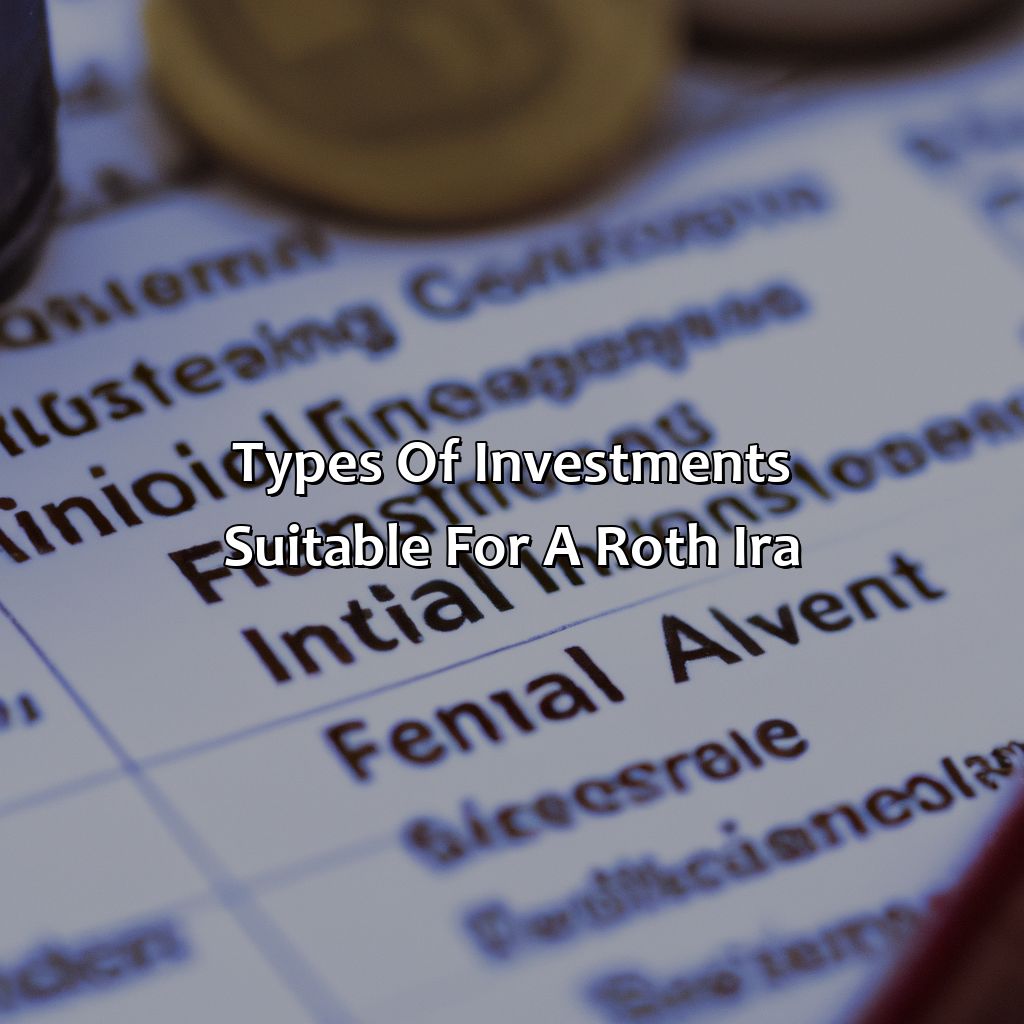
Image credits: retiregenz.com by Adam Washington
Stocks
One popular investment option for a Roth IRA is equity ownerships. Investing in stocks offers a great opportunity to diversify your portfolio and potentially earn significant returns over the long term. A stock or share represents ownership in a company, and as that company grows and becomes more profitable, the value of your shares can appreciate.
Investors can choose from various types of stocks, including common stocks, preferred stocks, and international stocks. Common stocks are the most well-known form of equity holdings. They provide investors with voting rights and dividends when declared by companies’ boards of directors. In contrast, preferred stocks offer priority regarding dividend payments and liquidation preferences.
When investing in international stocks, you diversify beyond US markets and potentially reap decent returns from overseas economies’ growth. However, this type of investment comes with additional risks such as currency exchange rates fluctuations.
Overall, allocating a portion of your Roth IRA investments in equities may result in higher potential returns over the long haul if you carefully consider your risk tolerance, time horizon, investment objectives, among other factors.
Want to invest in something as safe as a hug from your grandma? Bonds might be the way to go for your Roth IRA.
Bonds
Fixed Income Securities
Diversifying a Roth IRA portfolio with fixed income securities like bonds can provide a relatively consistent return on investment. Bonds are loans made to corporations or government entities, and investors earn interest on them. They are less volatile than stocks and can moderate the overall risk of your portfolio.
Corporate Bonds
A company issues corporate bonds to raise funds for business operations or ventures. Investors receive regular payments called coupon payments until maturity when the principal is repaid. Corporate bonds offer higher yields and returns compared to government-issued bonds but come with higher risk due to bankruptcy possibilities.
Municipal Bonds
Municipalities issue municipal bonds or munis, often called tax-exempt bonds. Not subject to federal taxes, they have lower yields compared to taxable securities but can make up for it in tax savings.
Inflation-Protected Bonds
Commonly known as TIPS (Treasury Inflation Protected Securities), these are US Treasury bonds that adjust for inflation. As inflation rises, so does the interest rate payable, leading to higher returns for investors.
Adding bond holdings into your Roth IRA portfolio can negate potential risks and enable savvy investing strategies that otherwise would not be possible. Consider various bond options depending on investment goals, risk tolerance level, and time horizon before making a sound decision.
Mutual funds: because sometimes you just want to invest in a pool with other people and hope there aren’t any pee-ers.
Mutual Funds
Investment in Collective Investment Funds
This type of investment is also known as Communal Fund, and it involves a pool of cash from different investors that trade in diversified portfolios. With a Roth IRA account, buying shares in an exchange-traded fund (ETF) or mutual fund’s class could be of benefit as it can offer the opportunity to invest in broader markets with less risk. The investment decision making and portfolio management is done by professional fund managers, making it a suitable choice for amateur investors.
In contrast to individual stocks, ETFs and mutual funds focus on diversifying investments among different companies, creating less risk exposure. Moreover, these funds require lower initial investments compared to individual stock purchases.
Consider your portfolio size before investing in Mutual Funds for Roth IRA. Look at the expense ratios before buying into any fund types. Bear in mind that expenses rack up a significant chunk of invested dividends and returns.
Don’t fall behind on proper Roth IRA Investments. Explore options like Mutual Funds for best results!
ETFs: Because sometimes it’s easier to invest in a group of stocks than to pick a favorite.
Exchange-Traded Funds (ETFs)
One investment type that can be suitable for a Roth IRA is a type of security that trades on the stock exchange known as Exchange-Traded Funds (ETFs). These funds resemble mutual funds but are traded like stocks, allowing investors to buy and sell them throughout the day. ETFs provide diversified exposure to specific sectors or asset classes, making them an efficient way to gain access to various types of investments.
Investing in ETFs can offer unique benefits when considering a Roth IRA. Since these accounts are designed for long-term growth, ETFs offer lower expense ratios compared to traditional mutual funds and allow for greater control over tax consequences. Additionally, because they are traded like stocks, investors have the ability to incorporate advanced trading strategies such as stop-loss orders or limit orders.
It is important to note that not all ETFs are created equal and investors should conduct thorough research before investing. Some popular options include broad market index funds such as the SPDR S&P 500 ETF Trust or sector-specific offerings such as the Technology Select Sector SPDR Fund. Asset allocation and diversification are crucial elements of any investment strategy, so it is recommended to consider a blend of different ETF types in a portfolio.
Incorporating ETFs into a Roth IRA provides a convenient opportunity for investors looking to build wealth for retirement while taking advantage of tax-free growth potential. However, it is essential to consult with a financial advisor and conduct proper research before making any investment decisions.
Five Facts About Good Roth IRA Investments:
- ✅ Roth IRA investments are tax-free when withdrawn in retirement. (Source: Investopedia)
- ✅ Good Roth IRA investments include low-cost index funds, target-date funds, and individual stocks and bonds. (Source: NerdWallet)
- ✅ Diversification is key to a successful Roth IRA investment portfolio. (Source: The Balance)
- ✅ A Roth IRA can be used for a first-time home purchase or for educational expenses without penalty. (Source: IRS)
- ✅ Roth IRA contribution limits for 2021 are $6,000 for individuals under age 50 and $7,000 for those over age 50. (Source: IRS)
FAQs about What Is A Good Roth Ira Investment?
What is a good Roth IRA investment?
A good Roth IRA investment is one that provides steady returns over time and has a low-risk profile. Some popular options include mutual funds, index funds, and exchange-traded funds (ETFs).
What is a mutual fund?
A mutual fund is a type of investment vehicle that pools money from multiple investors to purchase a portfolio of stocks, bonds, or other securities. They are managed by professional fund managers and offer diversification and convenience.
What is an index fund?
An index fund is a type of mutual fund or ETF that tracks a specific market index, such as the S&P 500. They offer low fees and broad market exposure, making them a popular choice for long-term investors.
What is an ETF?
An exchange-traded fund (ETF) is a type of investment fund that trades on stock exchanges like a stock. They are similar to mutual funds, but offer lower fees, more flexibility, and are generally more tax-efficient.
What is the difference between a traditional IRA and a Roth IRA?
The main difference between a traditional IRA and a Roth IRA is how they are taxed. Traditional IRA contributions are tax-deductible, but withdrawals are taxed as income. Roth IRA contributions are made after-tax, but withdrawals are tax-free in retirement.
Can I invest in individual stocks with a Roth IRA?
Yes, you can invest in individual stocks with a Roth IRA. However, it is important to remember that investing in individual stocks comes with higher risk, and it is important to diversify your portfolio to minimize risk.
